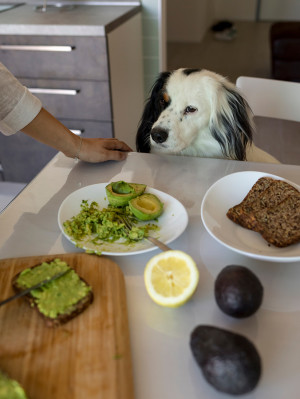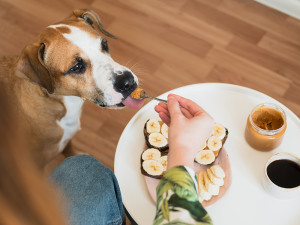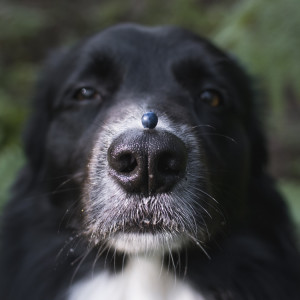Can Dogs Eat Oranges?
Yes and no. Learn how to safely feed citrus to your pup.

share article
Oranges aren’t just the punchline of a corny joke your uncle makes at family gatherings: “Orange you glad I didn’t say banana?” Cue the eye-roll. They’re also a pretty reliable snack when you’re craving something sweet but want to forgo the vending machine in favor of the fruit bowl in the break room. But what about when your dog is standing by, asking for a slice? Can they have one? While oranges are largely safe for dogs to eat, they do contain some components that can be toxic to dogs.
Nutrition Facts: Oranges For Dogs
Most people know that oranges are packed with vitamin C, with a single orange containing about 75 percent of the recommended daily value for a person. Oranges are also loaded with other essential vitamins and minerals, including copper, potassium, calcium, and numerous B-vitamins.
Are oranges good for dogs?
Despite being rich in vitamins and minerals, oranges aren’t particularly good for dogs. There’s no proven health benefit to feeding oranges to dogs, and their sugar content can be an issue for some dogs. If your dog is one of the few that enjoy citrus, oranges are fine as an occasional snack or treat, but they shouldn’t make up a significant part of any dog’s diet.
Can dogs eat orange peels?
Orange peels are toxic to dogs. Orange peels and other parts of the plant contain essential oils that can cause stomach upset. Eating orange peels can cause vomitingopens in a new tab and diarrheaopens in a new tab in dogs, so keep them out of their reach. Instead of offering orange peels to your dog, use them to garnish your favorite mixed drink. Who says you can’t be fancy at home?
Are oranges completely safe for dogs?
There are some parts of the orange that are not safe for dogs. The flesh of the fruit is safe for dogs to consume, but the peels, tree leaves, and tree branches contain oils that are toxic to dogs. Do not give orange peels to your dog and throw them away in a secure trash can.
The bottom line: Can dogs eat human foods?
Dogs can eat many human foods, but some foods that people eat are not safe for dogs. Always verify that foods are safe for dogs before offering them. Human food should not make up a significant portion of any dog’s diet. An occasional snack or treat can be fine, but these should make up less than 10 percent of your dog’s calories for the day.
Always start off with a small amount when offering your dog a new food or treat because they may be unexpectedly sensitive to it. If your dog has any health issues or is on any medications, talk to your veterinarian before introducing a new snack. Some human foods may cause negative effects for dogs with certain conditions. Keeping snacks limited is ideal, even if your dog tries to convince you otherwise.
Other Fruits That Are Safe for Dogs
Fruits are usually high in sugar, so they should be avoided in dogs with diabetes or obesity. Even in healthy dogs, fruit should not make up a significant part of their diet, but sharing a bite of these fruits here and there can be OK:
Blueberriesopens in a new tab: Blueberries are the perfect size for many dogs to catch out of the air, making them an easy snack to share. Blueberries are high in both fiber and vitamin C. If frozen, they can make a crunchy, cool treat during the hot summer months.
Apples opens in a new tabor applesauce: Apples are also full of fiber and vitamin C. They will need to be cut into pieces appropriate for your dog because dogs can choke on apple slices if they get excited and don’t chew them completely. Many dogs prefer a few licks of applesauce to whole apple pieces. Use the unsweetened version to minimize extra calories.
Bananasopens in a new tab: Some dogs go wild for bananas, which are high in potassium and fiber. Ripe bananas do contain a good bit of sugar, though, so limit it to a couple of slices when you’re sharing. Banana peels aren’t toxic, but they can pose a choking and intestinal obstruction hazard because they don’t digest well in the stomach.
Other Fruits That Are Potentially Dangerous
Avoid feeding these toxic fruits to your dog and keep them out of areas where your dog can reach them.
Grapesopens in a new tab: Grapes can cause acute kidney failure in dogs. The toxic ingredient, tartaric acid, is present in variable amounts in every grape, and some dogs are more sensitive to it than others. Because of this there’s no safe amount of grapes to feed a dog, so avoid this fruit entirely.
Raisinsopens in a new tab: Unsurprisingly, dried grapes aren’t great for dogs either. The toxin in grapes isn’t eliminated when they’re dehydrated to make raisins. In fact, raisins will contain more of the toxin by weight.
Tamarinds: Tamarinds are a sweet, tangy fruit commonly used in Mexican, Indian, and Middle Eastern dishes. Tamarinds contain an even higher amount of the tartaric acid that makes grapes and raisins so toxic.
FAQs (People Also Ask)
How many oranges can a dog eat?
Dogs can eat small bits of orange flesh if they enjoy it, but feeding whole oranges to dogs is not recommended.
Is it OK to give dogs oranges?
It’s fine to give your dog small bits of the flesh of oranges, but you should avoid sharing the peels because they can cause stomach upset.
Why do dogs like oranges?
Many dogs seem turned off by citrus fruits in general due to their tartness and acidity, but some may like the sweetness of oranges.
Can dogs eat oranges?
If they like oranges, dogs can have a small amount of the fruit as an occasional treat. Do not give them any peel, though, because they can cause stomach upset if eaten.
Are oranges healthy for dogs?
Although oranges contain many essential vitamins and minerals, there is no health benefit to feeding a dog oranges.
Can dogs consume orange peels?
Dogs should not eat orange peels because they contain oils that can cause vomiting and diarrhea.
Are oranges safe for dogs?
Oranges are generally safe for dogs in small amounts, as long as the peel has been removed.
References

Dr. Bartley Harrison, DVM
Dr. Bartley Harrison, DVM is a small animal veterinarian based in North Carolina who has practiced emergency medicine since graduating from the Texas A&M College of Veterinary Medicine. His primary interest areas include pain management, cardiology, and the treatment of shock.
He is a member of the Veterinary Emergency and Critical Care Society, American Veterinary Medical Association, and American Medical Writers Association. In addition to his clinical work, he writes pet health articles to help provide accurate information for both new and experienced pet parents. When he’s not working, he enjoys cooking, traveling, reading, and going on adventures with his dog.
Related articles
- opens in a new tab
Can My Dog Eat Honey? Learn If Honey Is Beneficial or Harmful For Dogs
They shouldn’t exactly have their paw constantly in the honey jar, but the sweet stuff can be beneficial in some cases.
![Puppy eating a bowl of blueberries]() opens in a new tab
opens in a new tab10 Superfoods to Share With Your Dog
From kale to quinoa, these nutrient-packed picks deserve a spot in your dog’s food bowl.
![Golden retriever looks at some eggs on the counter]() opens in a new tab
opens in a new tabCan Dogs Eat Eggs?
Get that protein, bro.
- opens in a new tab
Can Dogs Eat Avocado?
Hold the avo toast, please.
![View over the shoulder of a women eating peanut butter and bananas and feeding some of the peanut butter to her dog on a spoon]() opens in a new tab
opens in a new tabPeanut Butter Is the Best Snack. Can Your Dog Have It?
Elvis famously loved peanut butter. So, can your “Hound dog” lap it up, too?
![A close up view of a dog with a blueberry resting on its nose]() opens in a new tab
opens in a new tabCan Dogs Eat Blueberries?
Yep — blueberries are a fiber and antioxidant-packed snack for your pup.









